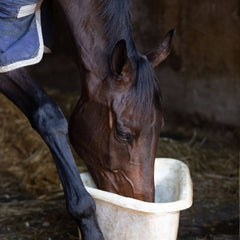
Consistent management regimes are recommended in the care of horses to minimize the incidence of digestive issues and stereotypic behaviors. Predictable feeding times support good welfare and minimize environmental distress for many captive and managed species. However, sudden alterations in feeding times and their effects on behavior has been little studied in horses. This is despite many horses being exposed to alterations in feeding times because of workload, competition requirements and caregiver-commitments.
The impact of sudden changes to a feeding routine on equine behavior was examined in eight, individually stabled horses (five mares, three geldings) aged between one and twelve years old1. Routine feeding of concentrate (1.6 kg of a barley-oat mix per horse) was at 06:00 am , followed by ad libitum provision of hay, and turnout at 08:00 am. Horses were remotely monitored by a single observer on three ‘observation’ days (Tuesdays, Thursdays, Saturdays) per week, for ten weeks. Horses were fed one hour earlier (at 05:00 am) on Tuesdays, at their normal time (06:00 am) on Thursdays and one-hour later on Saturdays (07:00 am). On each ‘observation’ day, horses were watched continuously for two hours – one hour prior to feeding and for an hour after feeding. Behaviors recorded were described as long-term (e.g., standing, lying, eating hay or concentrate) and scored every 5 minutes, or as short-term (e.g., drinking, kicking, pawing) and scored continuously.
Changes to usual feeding times impacted on both long and short-term behaviors. The time spent eating hay was significantly affected (F = 7.93; P < 0.01), as was the time spent resting (F = 9.26; P < 0.01), but there was no impact on concentrate feed consumption time (F = 0.32; P > 0.1). When fed early, horses had longer resting periods and less time eating hay than when fed at normal or later times. However, when fed later, horses showed increased frequencies of short-term ‘comfort’ or ‘anticipatory’ behaviors such as kicking (F = 3.91; P < 0.05), pawing (F = 5.99; P < 0.01), and looking at the stable door (F = 5.99; P < 0.01) than when fed at the regular or earlier feeding time.
Study results indicate that alterations in regular feeding times results in behavioral differences in horses. This is consistent with anecdotal reports and evidence from other species, where delayed feeding times results in the demonstration of anticipatory and frustration behaviors. When fed 1 hour earlier, horses rested longer and consumed hay for less time than observed during normal and late fed days, potentially indicating that they were not prepared to continue eating forage when fed concentrate meals earlier than usual. This suggests that to minimize behavioral impacts on managed horses, regular feeding times should be maintained.
References
Zupan M., Štuhec I. & Jordan D. (2020) The Effect of an Irregular Feeding Schedule on Equine Behavior, Journal of Applied Animal Welfare Science, 23:2, 156-163, Available HERE

